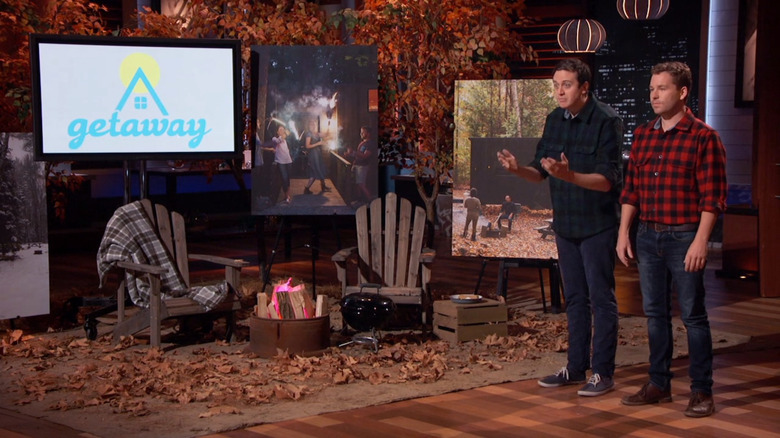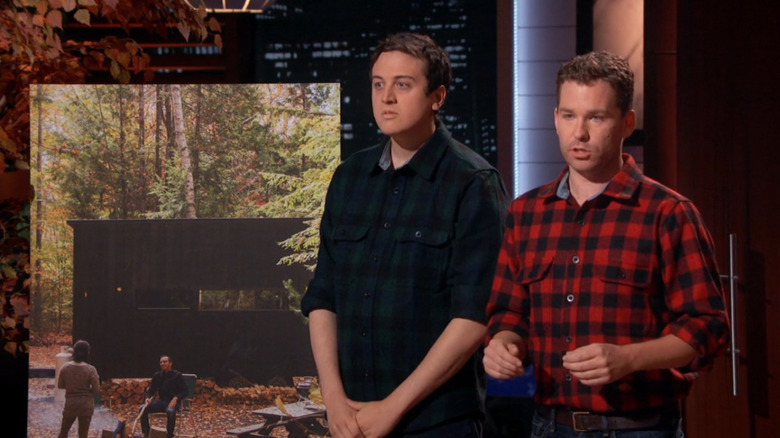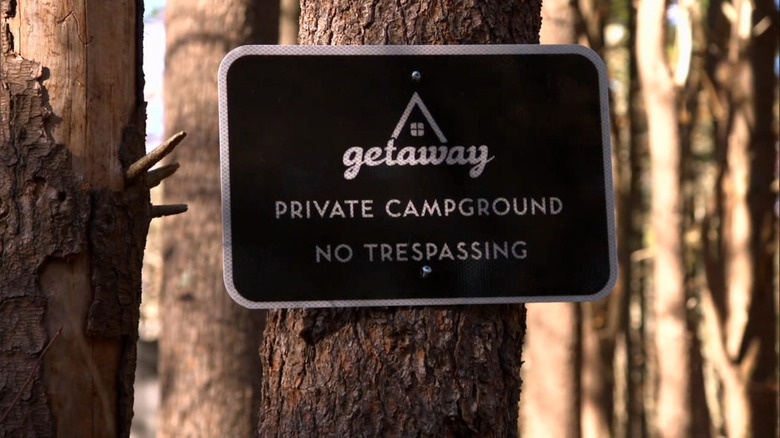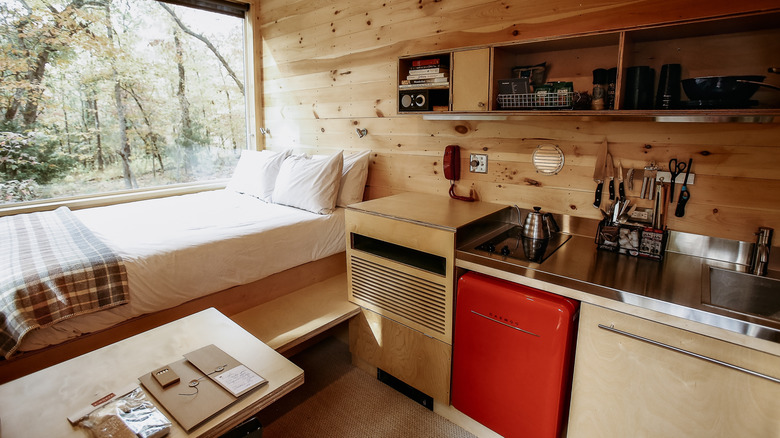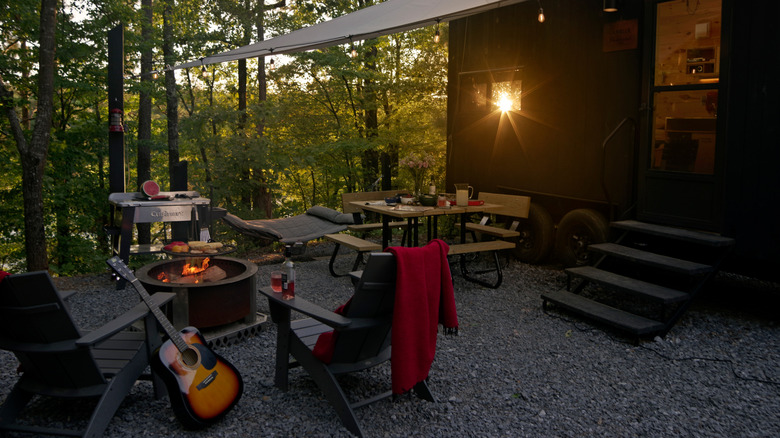What Really Came Of Getaway From Shark Tank?
We may receive a commission on purchases made from links.
The popular business reality competition series "Shark Tank" is all about innovation. Entrepreneurs go there to present their big ideas to seasoned investors like Mark Cuban and Kevin O'Leary, and more often than not, they showcase technology-centric products they claim will change the world. But Harvard college buddies Jon Staff and Pete Davis went the opposite direction. Their company, formerly known as Getaway (more on that later), sells the idea that sometimes, freeing yourself from technology is the way to go.
Getaway is a company that builds tiny cabins in the woods, offering an escape for city dwellers who have grown tired of their day-to-day hustle and bustle. The cabins are situated far enough from city centers that they get the illusion that they're off the grid but still close enough that it's unchallenging to reach them. The cabins are also unequipped with Wi-Fi, so visitors can fully unplug, but they're built to be comfortable to enhance relaxation. "We've always wanted Getaway to provide people with a way to easily get back to nature and reconnect with themselves and their loved ones," Staff told Whitewall. "What Getaway offers compared to other nature-based destinations is time and space for disconnection and a gentle nudge to put away devices during a stay."
Before "Shark Tank," Getaway only had 10 cabins operating in two places, Boston and New York. Staff and Davis joined the show hoping to secure $500,000 in funding, but they had difficulty convincing the sharks to bite.
Did Getaway get a deal on Shark Tank?
Longtime buddies Jon Staff and Pete Davis entered "Shark Tank," hoping to get $500,000 in funding in exchange for a 5% stake in the business. They pitched Getaway as a company that has "handcrafted the perfect way to escape" and provides a "hardworking Americans [an environment] to disconnect and recharge." The pair hoped to use the money to expand nationwide, confident they could reel in more occupants. At the time, they also boasted that they raked in $300,000 in sales with a 60% margin and anticipated garnering $2.1 million the following year. Over the next 5 years, they hoped to expand to 30 cities and build 1,000 more cabins.
While initially skeptical, Kevin O'Leary counter-offered with a $500,000 loan with 11% interest over three years and a 2.5% equity effective immediately. Barbara Corcoran wanted out, and so did Lori Greiner, who admitted that the woods creeped her out. Meanwhile, Mark Cuban expressed concern over Getaway's scalability, noting that the company would have to raise money for a long time and rebuild houses every few years. That leaves Chris Sacca, who offered $500,000 in funding for a 7.14% stake.
Staff and Davis almost accepted Sacca's offer, but after a brief discussion, they thought a 7.14% stake was too much and would be unfair to their current investors (they had raised $1.2 million prior), so they chose to walk away with nothing.
Getaway's Shark Tank exposure boosted its popularity
Jon Staff and Pete Davis had no regrets about turning down offers on "Shark Tank." Speaking with CNBC a year after their appearance on the show, Staff said that accepting the offers was tempting, but there was no point in partnering with people who don't share the same vision. "For innovative ideas, fundraising and picking partners, it's a lot more about finding people who connect to the common vision than about how much money they can bring to the table," he explained. Since none of the sharks was 100% sold on their product, there was a clear disconnect.
Luckily, they secured $15 million in funding shortly after. They told Washington Business Journal they would use the money to introduce Getaway in other markets. They also pointed out that they were being careful about their moves to avoid compromising their service. "It is not lost on me that I could've started a simpler business," Staff said. "That's the balance we have to strike, of wanting and needing to grow. But we can't do it at the expense of a great experience."
Their "Shark Tank" appearance was also quite fruitful, resulting in a deluge of visitors and a boost in reservations a day after the episode aired, per Business Insider. Staff also told CNBC they learned a lot from the sharks and accept "being a weird business that not everyone gets."
Getaway managed to secure even more funding from investors
In 2021, Tech Crunch reported that Getaway raised $41.7 million in Series C funding, and by then, the company had already raised $81 million overall since its inception in 2015. Jon Staff shared in his Whitewall interview that the company had been able to raise such amounts because a growing number of investors are beginning to believe in the power of going off the grid, if only for a little while. "We're lucky to have investors who believe in our mission, know there is a strong desire by people to spend more time in nature, and that Getaway offers an appealing outdoor experience to the urban consumer," he said. "Yes, they need to work less and disconnect more, but I am working with them on that."
Even though the cabins in the woods were Getaway's main draw, Staff asserted that they were looking to offer more beyond accommodations to offer more value to their customers. "The brand is not about tiny houses or tiny cabins, the brand is about [the fact that] the world is too noisy and too connected over the long haul. Getaway could be doing other things to solve that problem," he shared with Tech Crunch.
Getaway rebrands as Postcard Cabins
Despite leaving the tank without a deal, Getaway has experienced tremendous growth since its "Shark Tank" appearance. In October 2024, the company officially rebranded as Postcard Cabins in an effort to better reflect its mission of creating picture-perfect moments in nature. The rebrand coincided with significant expansion — growing from just a handful of cabins during their pitch on the show to more than 1,200 cabins spread across 29 destinations nationwide. This expansion ultimately drove annual revenue to an impressive $41 million, hinting at the possibility that the sharks may have missed out on a valuable opportunity.
Along with this remarkable growth, the company's growth story reached a major milestone in December 2024, when hospitality giant Marriott International acquired the brand. This acquisition marked a major validation of the concept that Davis and Staff had originally pioneered, cementing it as an innovative hospitality concept worth more travelers' attention. As announced in a press release, Postcard Cabins is set to become a part of Marriott's outdoor-immersion collection, integrating with the popular Marriott Bonvoy program in 2025.
With a whopping 40 million hours spent by more than 2 million guests at Postcard Cabins, the brand's mission to help people disconnect from technology and reconnect with nature has transformed the small startup into a hospitality phenomenon — unleashing a hospitality movement that proves, sometimes, the best business ideas are the ones that encourage us to take a break from it all in the first place.
"Shark Tank" is available for purchase on Prime Video.
